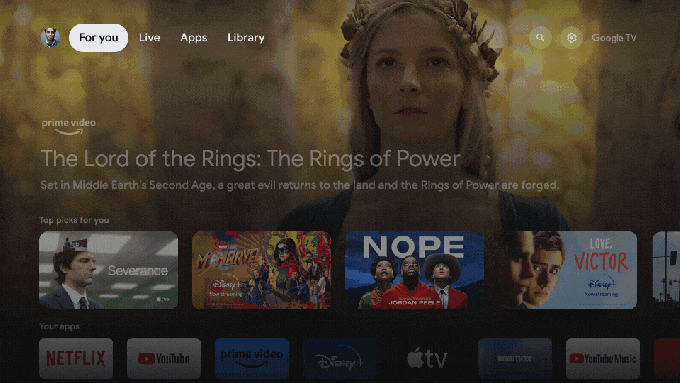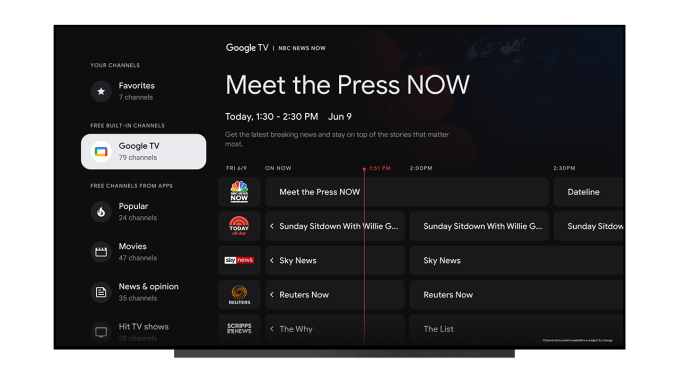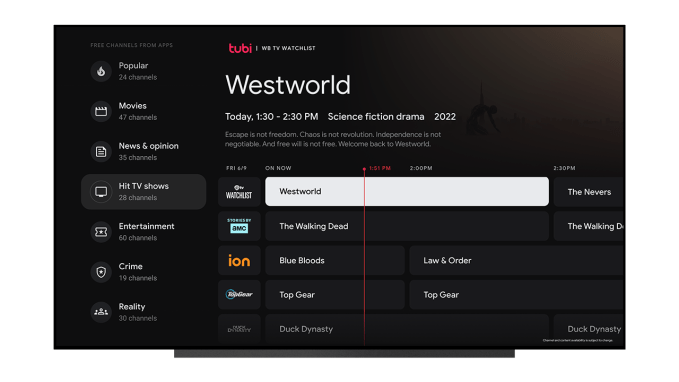Google TV, the company’s smart TV operating system that powers Chromecast devices and various TVs, is today getting a significant update aimed at expanding access to free, streaming TV. The company announced this morning Google TV will now integrate access to free streaming channels like Tubi, Plex, and Haystack News directly in its redesigned Live tab, alongside its existing lineup of channels from free streamer Pluto TV. In this tab, it’s also organizing its own set of now over 800 free live TV channels, including news channels from NBC, ABC, CBS, and FOX, and others featuring shows like “Westworld,” “Law & Order: SVU” and “The Walking Dead.”
The company claims this expansion will make Google TV the platform offering the most free TV channels within one electronic programming guide.
FAST channels, or free ad-supported television, have seen increased consumer adoption in recent months, in part triggered by inflation and the channels’ relative ease of access. Unlike ad-supported video, FAST channels offer a more traditional cable TV-like experience where content is streaming live when you tune in, which may appeal to new cord cutters. Many FAST channel providers also don’t require accounts to begin watching, which makes it easy to get started.

Image Credits: Google
Today, a number of services have adopted FAST channels as a way to reach price-sensitive viewers while still generating ad revenue for the service provider.
These types of FAST experiences can also be a selling point for smart TV platform makers, like Roku or Amazon Fire TV. For instance, Roku’s popular free streaming hub, The Roku Channel, hosts over 300 free live TV channels, in addition to its 80,000+ free movies and TV shows. A TiVo survey last year ranked Roku’s hub as the most popular ad-supported streaming service, with a 21.5% market share among consumers. Amazon’s Fire TV, meanwhile, offers a similar experience with Freevee, a free-streaming hub that also includes free live TV channels. Pluto TV, Xumo, Plex, Crackle Plus, Xperi and others have also long offered FAST content to viewers.
In addition, YouTube this year began testing its own FAST channel hub and even Netflix said it was open to considering the option.
In Google TV’s case, the company will introduce a redesigned Live tab that will make it easier for users to browse through the various channels without having to jump around from app to app. Here, users will also be able to favorite channels they like for a more personalized experience as well as browse recommendations.

Image Credits: Google
While a sizable number of free channels are now being offered, it’s worth noting that’s because Google has prioritized offering channels in a variety of different languages. The company says its new experience will include programming in over 10 languages, including Spanish, Hindi, and Japanese. The channels will offer a wide range of content, including news, blockbuster movies, true crime, classic TV reruns, cooking shows, and more.
Some of the new premium content, like “Westworld,” comes from licensing deals. Warner Bros. Discovery this year reached deals with Roku and Tubi to license thousands of hours of its programming, which the companies then used to create free, ad-supported channels on their respective services. “Westworld,” which had been removed from HBO Max’s library, had been among the licensed content.
It seems Google snagged a similar deal.

Image Credits: Google
In addition to organizing the free channels, Google says viewers who subscribe to paid services like YouTube TV or Sling TV will be able to watch those channels in the new Live tab as well. And if you use an antenna to capture over-the-air channels, those will also be fed into this new experience.
Google says the new live TV experience launches starting today to all Google TV devices in the U.S., including its Chromecast with Google TV and TVs with Google TV built-in from Sony, TCL, Hisense and Philips. The company later this year plans to bring the new TV guide and free channels to Android TV devices.
Google TV expands its free streaming lineup to over 800 live TV channels including Tubi, Plex, Haystack and more by Sarah Perez originally published on TechCrunch















 English (US) ·
English (US) ·